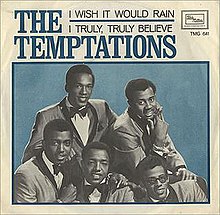
"I Heard It Through the Grapevine" is a song written by Norman Whitfield and Barrett Strong for Motown Records in 1966. The first recording of the song to be released was produced by Whitfield for Gladys Knight & the Pips and released as a single in September 1967. It went to number one on the Billboard R&B Singles chart and number two on the Billboard Pop Singles chart and shortly became the biggest selling Motown single up to that time.

"Ain't Too Proud to Beg" is a 1966 song and hit single by The Temptations for Motown Records' Gordy label, produced by Norman Whitfield and written by Whitfield and Edward Holland Jr. The song peaked at number 13 on the Billboard Pop Chart, and was a number-one hit on the Billboard R&B charts for eight non-consecutive weeks. The song's success, in the wake of the relative underperformance of the previous Temptations' single, "Get Ready", resulted in Norman Whitfield replacing Smokey Robinson, producer of "Get Ready", as The Temptations' main producer. In 2004 it finished number 94 in AFI's 100 Years...100 Songs poll thanks to its inclusion in The Big Chill soundtrack.

"I Can't Get Next to You" is a 1969 No. 1 single recorded by the Temptations and written by Norman Whitfield and Barrett Strong for the Gordy (Motown) label. The song was a No. 1 single on the Billboard Top Pop Singles chart for two weeks in 1969, from October 18 to October 25, replacing "Sugar, Sugar" by the Archies and replaced by "Suspicious Minds" by Elvis Presley. The single was also a No. 1 hit on the Billboard Top R&B Singles for five weeks, from October 4 to November 1, replacing "Oh, What a Night" by the Dells, and replaced by another Motown song, "Baby I'm For Real" by the Originals.
"Psychedelic Shack" is a 1969 single for the Motown label performed by the Temptations and produced by Norman Whitfield. It became a hit single in 1970.
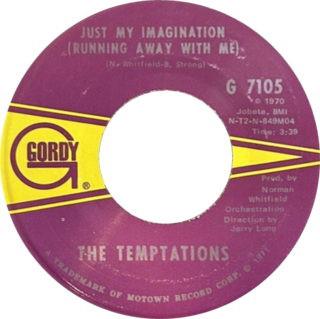
"Just My Imagination (Running Away with Me)" is a song by American soul group the Temptations, written by Norman Whitfield and Barrett Strong. Released on the Gordy (Motown) label, and produced by Norman Whitfield, it features on the group's 1971 album, Sky's the Limit. When released as a single, "Just My Imagination" became the third Temptations song to reach number one on the US Billboard Hot 100. The single held the number one position on the Billboard Pop Singles Chart for two weeks in 1971, from March 28 to April 10. "Just My Imagination" also held the number one spot on the Billboard R&B Singles chart for three weeks, from February 27 to March 20 of that year.
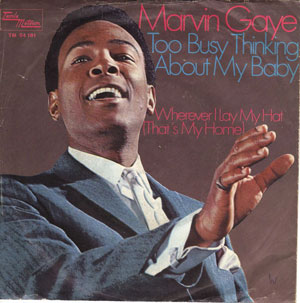
"Too Busy Thinking About My Baby" is a Motown song written by Norman Whitfield, Barrett Strong, and Janie Bradford. The song was first recorded by The Temptations as a track on their 1966 album Gettin' Ready. Eddie Kendricks sings lead on the recording, which was produced by Whitfield. Jimmy Ruffin also recorded a version with The Temptations providing background vocals in 1966. It remained unreleased until 1997.
"(I Know) I'm Losing You" is a 1966 hit single recorded by the Temptations for the Gordy (Motown) label, written by Cornelius Grant, Eddie Holland and Norman Whitfield, and produced by Norman Whitfield.

"Smiling Faces Sometimes" is a soul song written by Norman Whitfield and Barrett Strong for the Motown label. It was originally recorded by the Temptations in 1971. Producer Norman Whitfield had the song re-recorded by the Undisputed Truth the same year, resulting in a number-three Billboard Hot 100 position for the group. "Smiling Faces" was the only Top 40 single released by the Undisputed Truth, and was included on their debut album The Undisputed Truth.

Solid Rock is a 1972 album by The Temptations for the Gordy (Motown) label, produced by Norman Whitfield. The LP was the first made primarily without founding members and original lead singers Eddie Kendricks and Paul Williams. Frustrated by conflicts and fights with Temptations Otis Williams and Melvin Franklin, and producer Whitfield's steadfast insistence on producing psychedelic soul for the group when they really wanted to sing ballads, Kendricks had quit the act and negotiated a solo deal with Motown's Tamla label.

Greatest Hits II is a 1970 greatest hits album for The Temptations, released by the Gordy (Motown) label. The sequel to the first Temptations greatest hits LP from 1966, Greatest Hits II collects several of the late-1960s hits that followed the release of the first compilation. Included here are the final collection of David Ruffin-led singles, including "(I Know) I'm Losing You", "I Wish It Would Rain" and "I Could Never Love Another ", and the first of the Dennis Edwards-led psychedelic soul records, including "Cloud Nine" and "Psychedelic Shack". A new non-album single, the #3 hit "Ball of Confusion ", is also included.
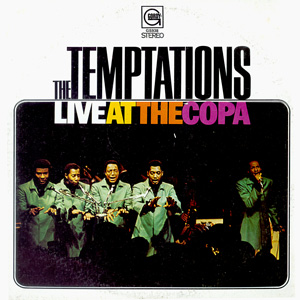
Live at the Copa is a 1968 live album recorded by The Temptations at the Copacabana supper club in New York City. Released in 1968 by Gordy (Motown) Records, Live at the Copa features new lead singer Dennis Edwards in place of David Ruffin. Edwards' first studio album with the Temptations would be the group's next album, 1969's Cloud Nine.

The Temptations Wish It Would Rain is a studio album by the Temptations, released in 1968 via Gordy Records. It was the final release from the group's "Classic-5" era, during which David Ruffin, Eddie Kendricks, Paul Williams, Melvin Franklin, and Otis Williams constituted the Temptations' lineup.
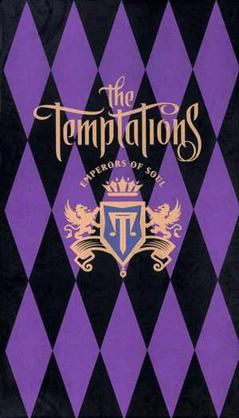
Emperors of Soul is a 1994 box set compilation for The Temptations, released by Motown Records. The five-disc collection covers the Temptations' entire four-decade history, from the first recording of The Distants in 1959 to four new recordings by the then-current Temptations lineup of Ali-Ollie Woodson, Theo Peoples, Ron Tyson, and stalwart members Otis Williams and Melvin Franklin.
"I Could Never Love Another (After Loving You)" is a single recorded by the Temptations and released on Motown Records' Gordy label during the spring of 1968. The song is the last with lyrics by Rodger Penzabene, and as the final Temptations single to feature David Ruffin as lead singer.
"The End of Our Road" is a single written by Roger Penzabene, Norman Whitfield and Barrett Strong in 1967. Originally recorded by Gladys Knight & the Pips and issued as a single in 1968, the Pips' version of the song, became another top forty hit for the family group as it peaked at number fifteen on the pop singles chart and number five on the R&B singles chart.
"I'll Be in Trouble" is a 1964 hit single by The Temptations for the Gordy (Motown) label and written by Miracles lead singer Smokey Robinson.
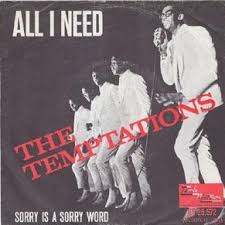
"All I Need" is a 1967 hit single recorded by The Temptations for the Gordy (Motown) label. It is the group's first single to be produced by Norman Whitfield's protégé Frank Wilson. Written by Wilson, Eddie Holland and R. Dean Taylor, the single was a Top 10 hit on the Billboard Hot 100, peaking at number 8; it was also a number-two hit on the Billboard R&B singles chart.
"(Loneliness Made Me Realize) It's You That I Need" is a 1963 song that became a 1967 hit single recorded by the Temptations for the Gordy (Motown) label, produced and co-written by Norman Whitfield. Billboard described the single as a "groovy rocker" that "is loaded with excitement and another top vocal workout."
"Please Return Your Love to Me" is a 1968 hit single by The Temptations for the Gordy (Motown) label. Produced by Norman Whitfield, who co-wrote the song with Barrett Strong and Barbara Neely, it is the last single to feature David Ruffin in the lineup. With Eddie Kendricks singing lead, it peaked on the Billboard Hot 100 Pop charts in the Top 30 at number 26, and number 4 on the Billboard R&B Singles charts. Billboard described the single as a "strong easy beat ballad loaded with sales appeal." Cash Box said that it is "in a slow vein that carries new shades of power in the group’s familiar style" and is "backed by the solid Motown rhythm section."

"Gonna Give Her All the Love I've Got" is a 1967 Soul song, originally recorded and made a hit by Jimmy Ruffin on Motown's Soul Label imprint. Ruffin's 1967 original version, from his album Jimmy Ruffin Sings Top Ten, reached the Pop Top 30, peaking at #29, and was a Top 20 R&B Hit as well, peaking at #14. It was also a hit in Britain, reaching #26 on the UK Singles Chart. The song has a social context: it depicts a man anticipating his release from prison on the morrow, when he'll return home on a train to "the girl that I left behind," promising himself that he will reward her steadfast love for him by "giv[ing] her all the love [he's] got." The song was written by Norman Whitfield and Barrett Strong and produced by Whitfield.
